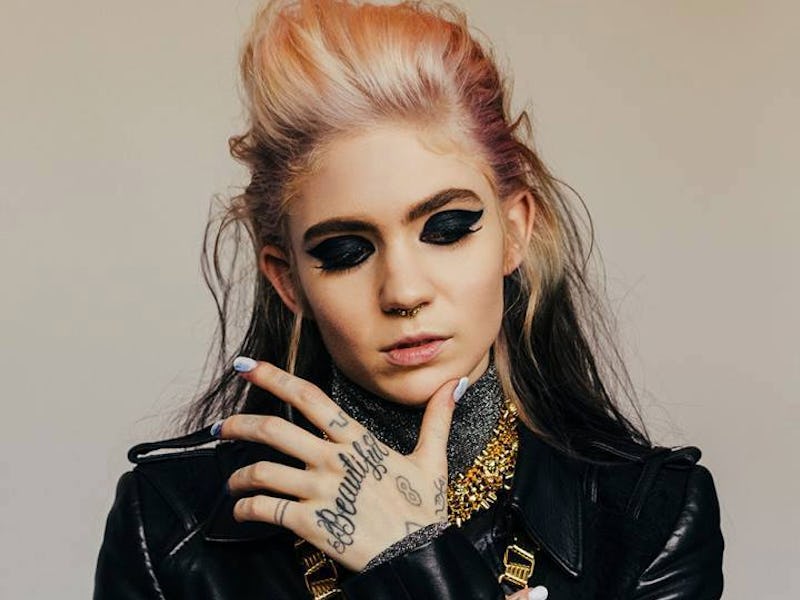Grimes Lightens Up on Her New Album 'Art Angels'
Brighter and often catchier than 'Visions,' Grimes' new album is her poppiest to date, but not the full makeover we anticipated.

It took three years — and making and scrapping a whole album — for Grimes to finally figure out her next step. Her 2012 breakthrough full-length, Visions, was a snowballing success for the Canadian electronic artist and singer/songwriter. The perhaps-unexpected level of attention it attracted allowed her to sign a management deal with Jay-Z’s Roc Nation and move away from her default pose of indie curiosity. She’s now something closer to a pop star, a transformation illustrated by last year’s massive, Top 40-ready edifice “Go,” this year’s “REALiTi,” and a tour with fellow Charli XCX. Still, Grimes the emerging pop star wasn’t much more scrutable than Grimes the outlier.
Whether or not you believe her music can chart, Grimes’ lustrous, hazy sound has always held a unique promise. It’s a refreshing amalgam — a left-of-the-center, self-reflexive take on hyperactive experimental electronic music and dance-friendly pop that’s distinctly of-its-time. When you listen to Boucher’s new album, Art Angels, the substantiated fact that she is becoming increasingly obsessed with picking apart the DNA of Top 40 music is immediately clear. The atmosphere is much more transparent than on the murkier, less stylistically manifold Visions. The record is all the better for this, and her obsessive, almost academic interest in the craft doesn’t feel forced.
More than many of her alt-pop contemporaries, Boucher realizes that it can take as little as a high unintelligible yelp to make a song infectious, and she usually picks effective ones to anchor hers. Nowhere is this illustrated better than the strongest early leak from the album and its second track, “Flesh Without Blood.” The lays out Boucher’s basic plan of attack for the album songwriting-wise — in which wordless wails speak as loud as words. She fills out the picture sonically by fuzzing up a basic driving pop backing track, turning motorik pop-punk-like bass lines — that might otherwise sound sterile and on-the-nose — sludgy and atmospheric. Muddying the well a bit is typical for Grimes.
Her sonic universe is one very much like those we are used to — and even tired of from long cycles in radio rotation — but a few important things are out of whack. Her voice that is prankishly always just a little shy of sounding like that of a human being — thanks, often, to subtle electronic manipulation. Hooks are big and indelible — invested with the broadest possible appeal, but realized in a way that only Boucher can. Grimes always gets a leg up on even her most sugar-coated hooks, and retains her slightly mystical, slightly bristly identity.
Outside of her gift for writing acrobatic hooks, Grimes’ primary strength is her versatility as a singer, and she extends her range even further on Art Angels. “Kill V. Maim,” one of the album’s grittiest moments, provides a good primer of the contrasts of which Boucher is capable. The title seems to evoke the two primary vocal modes she inhabits in the song. Grimes either shrieks, autotuned, at the top of her range or raps coyly in baby-talk tones. It evokes, to some extent, LeTigre as much as Charli XCX.
Tracks like this affirm that Grimes’ music remains a thoroughly acquired taste: Her platform may be big, and she may have fielded songs to Rihanna, but don’t expect a radio takeover anytime soon. Boucher at her most restrained is still something pretty outside the usual, and often it’s those songs that shine the most. Piano power-pop anthem “Easily” works almost like Grimes as Adele, and the opening violin-and-driven miniature “laughing and not being normal” is successful, dramatic baroque-pop — definitely something new and unusually subtle for her.
The overall takeaway from Grimes fans? Yes, this is a lighter, more centrist record than Visions. “California” is probably the closest she’s ever gotten to Katy Perry, from the lilting, declamatory mid-range singing to the uptempo sunshine-electro backbeat, and closer “Butterfly” flirts with the contemporary tropical house wave that Justin Bieber is currently riding.
But this isn’t the norm for Art Angels. Too many self-conscious attempts to be totally straightforward could have easily resulted in an anodyne record that nobody wanted from the new and improved Grimes. Having a little of outright pop is great. It’s just another bullet point on the long list of things of which Boucher is capable — evidence of the versatility that allows her to loom bigger than indie.